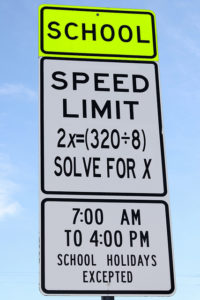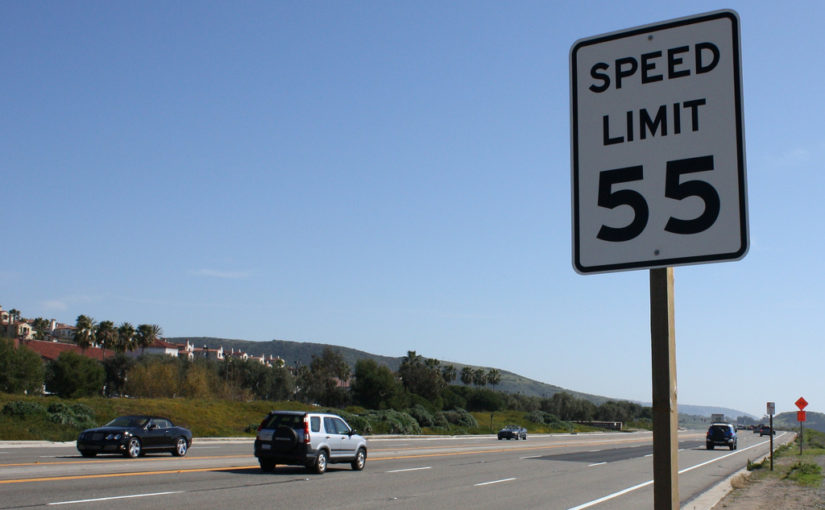You’re getting bad advice. Ever since I was in elementary school, all of my well-meaning teachers have been telling me to slow down. I’m a fast-talker.
When it comes to communication skills, the conventional wisdom is often completely wrong! Even in university level public speaking classes and Toastmasters clubs they tell you over and over to slow down.
They are completely wrong.
The presentation speed limit is the perfect example of a belief that has been passed down for generations. The advice is so pervasive that well-meaning teachers assume it’s true without any evidence.
Welcome to the first in a series of posts on “Communication Myth-busters.”
The Benefits of Fast-talking
For many years, I crisscrossed the country teaching all-day seminars to audiences all over the United States. At the end of the day I always passed out an evaluation form.
By implementing the public speaking techniques I discuss on this blog, I almost always earned maximum scores in every category from “holding the audience’s attention” to “personalizing the information.”
However, in the comment section, where workshop attendees wrote open-ended feedback, I kept seeing one complaint over and over.
The speaker talks too fast. Too much information. Slow down.
Despite the fact that I received this complaint in almost every workshop, it didn’t stop them from scoring me well on “keeping it interesting.” This complaint didn’t stop people from recommending the course to others, and it didn’t stop them from calling my boss and specifically requesting me by name over other instructors.
In other words, talking fast didn’t hurt me at all!
Here’s why–even more often than I received a complaint about fast-talking, someone would write a compliment in the comments:
Speakers was very knowledgeable! Great expertise.
Even though I talked “too fast” people saw me as a knowledgeable expert. Or better said: BECAUSE I talked fast, people saw me as an expert!
The Science of Speed-talking
You see all of those people that have been telling you to slow down don’t know the science. The science as early as the 1970s began discovering that fast-talkers are seen as MORE credible and more persuasive! (Miller et al., 1976)
Just think of the stereotypical hillbilly talking really slow with a long drawl. He’s perceived as stupid!
Fast is more credible. Slow is less credible.
Of course, I’d be lying if I told you it was always that simple. It’s not actually true that fast-talkers are smarter. That’s only the impression. Also, there is such a thing as too fast, but generally speaking it’s better to error on the side of too fast than too slow.
Unfortunately, 95% of the public speaking coaches and websites out there will tell you exactly the opposite.
It gets even more complicated. Research into the rate of speech shows that fast-talking isn’t always better, and slow-talking isn’t always worse. For example, if you are presenting a message that the listener already agrees with – slow talking is better (Smith & Shaffer, 1991).
On the other had, if you are trying to persuade someone to change their mind, to form an opinion about something new, or to agree with you when their not very interested, fast-talkers win. Hence, the stereotypical “fast-talking” salesman.
How Speed Influences the Listener

In other words, it’s complicated.
So much of the advice people give about public speaking and communications is bad advice because it’s presented from the perspective of the SPEAKER.
If we want to understand the best techniques we have to look at advice from the perspective of the LISTENER.
I’m sure you’ve heard this rationalization:
Slow down so that the audience can understand!
FALSE! FALSE! FALSE!
The human brain can process words faster than almost any speed-talker can speak. Even an average reader can process words at 250 wpm or higher. With a little practice you can read 400 wpm or higher and understand every word, whereas the average conversation is closer to 150 wpm.
The difference between a fast-talker and a slow talker is not in the listener’s ability to UNDERSTAND. The difference is in the listener’s available time to RESPOND.
The reason the “fast-talking” salesman can be more persuasive is because he doesn’t give you time to think up and articulate counter-arguments.
The reason the slow-talking hillbilly sounds stupid is because he gives you ample time to articulate judgments.
When you know the audience already agrees with you, slow talking works better because you are giving them time to articulate “Yes, I agree.”
It’s Not About the Speed
So what does this mean in real life?
Stop trying to think about and alter how fast you’re talking. Just be yourself. Stop listening when people tell you to slow down.
If you want to be more credible and more persuasive, you don’t have to worry about your SPEED, you only have to worry about your PAUSES.
 I’ve very rarely coached anyone on their speed. Controlling when and how often you stop talking is far more effective than worrying about your speed.
I’ve very rarely coached anyone on their speed. Controlling when and how often you stop talking is far more effective than worrying about your speed.
When you know people will agree or want the message to sink in, stop talking for a few seconds. When you want to present your more dicey arguments without a response, don’t stop talking.
It’s all about the PAUSE.
In my SpeechDeck presentation skills system, different types of pausing can be used to “inject anticipation” or “encourage participation” or “engage the subconscious.” Mastering the pause is one of the most important techniques you can learn to take your public speaking skills to the next level.
When you encourage the listener to respond verbally, you are targeting the conscious, rational mind. When you strategically arrange your pauses to prevent the listener from articulating words, you are manipulating their subconscious.
This is just the first in a series of communication myths. In general don’t listen to the presentation skills advice of the masses. The masses are mediocre.
The advice to slow down is just one example. Bottom line: Ignore the speed limit.
Speed limit image courtesy: Flikr: David Lofink


One thought on “Myth-buster: Speed limit”
Comments are closed.